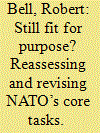| Srl | Item |
| 1 |
ID:
171712


|
|
|
|
|
| Summary/Abstract |
Resource allocation to and within defense budgets is grand strategy. NATO and the EU coordinate defense planning and encourage fair burden-sharing among their members. We analyze the effect of agreed planning processes, namely the “NATO Defense Planning Process (NDPP)” on the conversion of political will to resources and then to capabilities development across the transatlantic security community. In a “fog of peace” featuring diverse threats, and in which allies may disagree on strategic rivals and sources of risk, national and regional political economies shape strategy, not the other way around.
|
|
|
|
|
|
|
|
|
|
|
|
|
|
|
|
| 2 |
ID:
186544


|
|
|
|
|
| Summary/Abstract |
NATO’s 2010 Strategic Concept established three core tasks for the Alliance: collective defense, crisis management, and cooperative security. While those tasks remain sound, the 2010 Concept reflected a different geopolitical, geostrategic, and security environment from today’s, characterized by renewed conflict with Russia, concerns about China’s strategic and economic ambitions, and new security challenges like hybrid threats and disinformation. Considering the changed strategic landscape and emerging challenges, we argue that NATO should make several refinements to its core tasks. European Allies must improve defense capabilities, ensuring their ability to help NATO meet its core tasks. In conjunction with the other Allied nuclear powers (the United Kingdom and France), the U.S. must renew its commitment to maintaining NATO as a nuclear alliance. NATO should adopt a more rigorous operational definition of crisis management, and a more systematic emphasis on the early warning and pre-crisis phases. Finally, while national “resilience” is already implied in Article 3ʹs requirement for member states to “maintain and develop their individual and collective capacity to resist armed attack,” adding it as a fourth core task would powerfully emphasize the need for allies to address new elements of resilience, to include both technological threats and democratic backsliding.
|
|
|
|
|
|
|
|
|
|
|
|
|
|
|
|